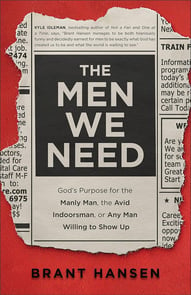Passive. Aggressive. Passive-aggressive. These are not the men the world needs. Which begs the question: What kind of man does the world need?
Try to finish these two statements:
“Our world does not need any more men who ___________.”
“Our world does need more men who __________.”
Often, it’s easier to finish a negative statement, identifying something by what it is not. Why? Because it is easier to tear something down or identify what is wrong with something than to build something up and identify what is right. (This holds true for both some-things and some-ones.)
That’s why it’s important to challenge ourselves to go beyond the easy and the negative. Let’s dig deeper into positively defining the men that our world needs.
Identifying the men our world needs
I work at Christian Care Ministry/Medi-Share, where we are blessed to be able to engage in activities designed to help us pursue Christ and Christlikeness in our workplace, one of which is a weekly men’s fellowship. The focus of our men’s fellowship during the first quarter of this year took us on a quest to identify in positive terms the kind of man our world desperately needs. To do this, we utilized Family Life’s podcast featuring Brant Hansen in which he discussed his book, The Men We Need.

Brant Hanson says, “We men are at our best when we are keepers of the garden” (p. 17). He uses that metaphor to describe when men are at their best — when we protect, defend, and cultivate. This concept comes from God’s charge to the first man ever created.
The man God created for the world
When God created the first man, God charged Adam to be a keeper of the garden by cultivating and watching over it (Genesis 2:15). Looking at those two words in Hebrew helps us understand God’s desire for men.
First, the Hebrew word avad, which is often translated “to work” (ESV, NIV), also means “to serve” or “to provide service.” This word can also mean “to worship,” as we provide service to God (see Exodus 3:12). As such, the first man was charged to render service to God and others in the garden.
Second, the Hebrew word shamar, which is often translated “to keep” (KJV, ESV, NASB), also means “to guard,” “to protect,” “to watch over,” even “to care for” something. As such, the first man was charged to provide safety and security for the garden and those in it.
As we put both terms together, we begin to see God’s intent for men: Men are to serve those around them so they can thrive and flourish (cultivate the garden) and to be a source of safety, protection, and security (watch over the garden).
Hanson writes, “God created man and woman in his image, and that means they were made to be creative and actually do things that matter. So, God gave Adam the job of looking after the garden and the things within. He was to guard it, tend it, and help it flourish. He was responsible for it” (p. 29).
The fall of the man God created for the world
Sadly, like the first Adam, we men often fail to take responsibility to cultivate and watch over our garden, which is the world in which we live and the people in it.
When sin first entered the world, bringing shame, separation, fear, difficulty, and death with it (Genesis 3:7-10, 16-19), the man failed to take responsibility and instead stood by passively watching. He was not watching over his wife, guarding or protecting her as God charged him to do. Rather, he was just watching.
The man who was to help his wife flourish and keep her safe, silently stood by and watched as the deceiver led her astray. He said and did nothing as his wife was tempted by the serpent to question God’s instruction and goodness. He stood by as she was deceived into taking a counterfeit to God’s plan for her life. (Genesis 3:1-6; 1:26-27)
The Word of God makes this passivity clear. After Eve ate, “she also gave to her husband who was with her and he ate” (Genesis 3:7, italics added). Adam was there with her, passively standing by. But rather than taking responsibility before God for his failure, Adam threw his bride under the metaphorical bus and blamed both God and her for his actions (Genesis 3:12). Sadly, this cycle continues to this day.
The men our world desperately needs are the men who take responsibility to both cultivate and watch over our garden as God desires.
The new man God gave to the world
The good news is that though the first Adam failed, the Second Adam, Jesus, did not! Jesus did not stand by passively in the face of deception and sin. In fact, he took responsibility for the whole world and all the sins committed in it (Matthew 26:27-28; 2 Corinthians 5:21; 1 John 2:2).
Moreover, he poured out His Presence, the Holy Spirit, into the lives of those who have trusted in Him (see Matthew 3:11; John 7:39, Acts 2:33; Titus 3:5-6). Trusting in Jesus and being filled and led by the Holy Spirit enables us to follow the Messiah’s example.
Hanson paints a vision for us men to follow Jesus’ example and be the keepers of our garden, just like Jesus. In order to do so, we need to stop being passive and take responsibility not only for ourselves but for those around us. How do we do that?
.png?width=1200&height=800&name=Untitled%20(20).png)
Becoming like that new man in this world
Hanson goes into detail about six decisions we men can make to set us apart to be the men our world desperately needs — the very men God has created us to be.
- We must decide to forsake the fake and relish in the real. Far too many of us men check out of real life and fall for the trap and lie that the fake, the virtual, has real meaning and significance.
- We must decide to protect the vulnerable. We need to get off the sidelines (or the couch) and into the game. We need to look after our families, our neighborhoods, our communities. We need to stop being threatening to those we are charged to protect and instead become threatening only to those who seek to steal, kill, and destroy.
- We must be ambitious about the right things. We need to stop focusing on meaningless things and focus on things that matter in this season of life. That may mean putting our career ambitions on hold (for a time) so that we can be present to help our wives and children flourish before we wake up one day to find they are gone and we missed it.
- We must decide to make women and children feel safe, not threatened. Whether single or married, we are to foster safety and security for the women and children around us. That means we may need to intervene to keep a stranger safe. It may mean we need to stop justifying our anger, our lust, and our fear of commitment and grow up.
- We need to decide today who we will become tomorrow. We need to stop being so needy, take responsibility for our choices and their outcomes, and stop being led by our fleeting desires. We need to make choices today that will impact our tomorrow for the better.
- We need to decide to take responsibility for our own spiritual life. Bottom line: we must live with integrity and sincere loyalty to God and those around us.
Though this list is not exhaustive (and my summary does not do justice to Brant Hansen’s book), these decisions can help us men be the keepers of our gardens.
It’s time to be the men our world desperately needs; the men God has called us to be — men who keep our gardens. Let’s encourage one another to rise to that challenge. Praise the Lord that with Him, we can and will.
As seen in the Christian Post.






